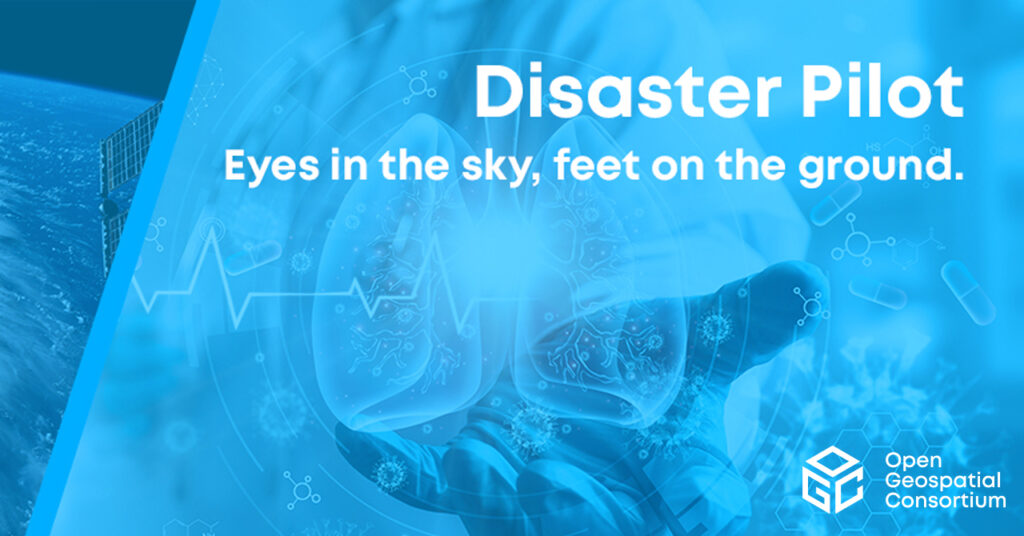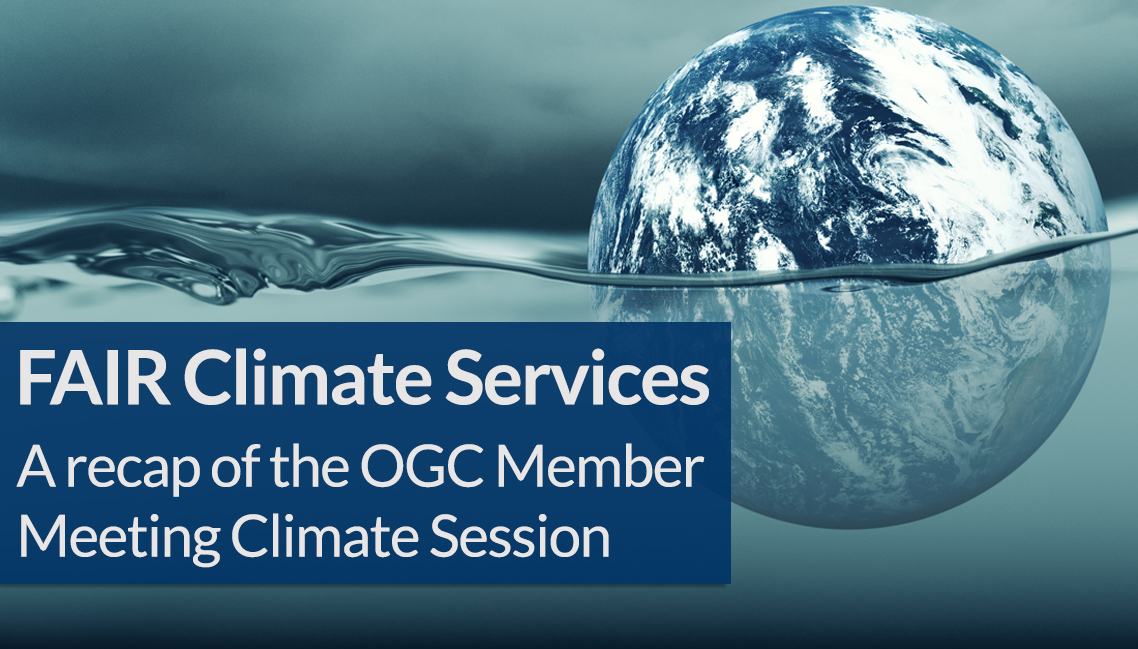Producing and providing reliable information for climate services requires huge volumes of data to come together and process from different scientific eco-systems – requiring standards and collaboration to support evidence-based decision making. The OGC membership has already decades of experience in providing expertise, innovation, standards and operational best practices in various sectors.
To convene the community, OGC organized a special session at the 118th Member Meeting (March 25). The session invited experts worldwide to help us consolidate our thinking, identify areas for contribution to this global challenge, determine next steps, and begin collecting elements in an OGC Community Practice document, discussing how to realize FAIR guiding principles for climate services and how to enable high level climate services information systems.
OGC Member meetings climate session
The session brought together OGC Members across government and industry, offering a variety of speakers representing OGC members as well as the GEO Secretariat and the African Center of Meteorological Applications for Development (ACMAD):
- Cameron Wilson (NRCanada): OGC and Climate Change
- Angel LOPEZ ALOS (ECMWF): COPERNICUS Climate Service – A European Perspective
- Carsten Ehbrecht (DKRZ): Using OGC Web Processing Service for the European Copernicus Climate Data Store.
- David Huard (Ouranos): FAIR Climate Services – A Canadian Perspective
- Andre Kamga (ACMAD): Big Data and robust climate information services in Africa: opportunities and challenges
- Sara Venturini (GEO Secretariat): The bigger picture: UN climate policy framework
- Ilene Carpenter (HP Earth Science): A supplier perspective on federated data stores
- Nils Hempelmann (OGC): Documenting community best practices
Presentations and lively discussions strived to imagine how to build climate services information systems that would rise to the challenges of adapting to future climate conditions.
The session framed the issues around the delivery of climate information to support adaptation decisions to facilitate the difficult and time consuming work of climate service centers. These centers may have a local, regional or international scope, but typically act as boundary organizations, connecting clients to climate science data and expertise. As demand increases for climate products, climate service centers are pressured to develop and deploy IT systems to access and process climate data more efficiently, and expand the range and complexity of services they deliver. Although climate adaptation challenges vary across regions, data processing workflows are very similar, and could benefit from shared information systems.
Ongoing developments of climate services information systems
The OGC Climate AdHoc session outlined technical challenges and solutions for such systems, and kickstarted discussions on how the location community can contribute to building climate service infrastructures. Examples of existing services information systems discussed during the Climate AdHoc Session include the COPERNICUS Climate Change Service (C3S), Climate Data Canada and Climate Information delivery for African Countries by the African Center of Meteorological Applications for Development (ACMAD). These systems provide climate data products, such as drought bulletins, and some also host data processing services meant for the climate services community.
To succeed in providing relevant climate information at local scales, climate services infrastructures must be able to access and query data catalogs, manage the abundance of data, subset and regrid data from models and observations, make scale and bias adjustments, compute climate indicators that are meaningful to decision-makers, include confidence assessments accounting for the leading sources of uncertainties, and present this information clearly and transparently.
Ongoing activities within OGC’s global community of location experts contribute to the expansion of the functionality and robustness of climate services:
- Data subsetting and averaging services were recently released with WPS module rook from the Copernicus ROOCS (Remote Operations on Climate Simulations) project. Given a bounding box, the service can extract the gridded time series and eventually compute spatial and/or temporal averages.
- Climate indicator computations offered as on-demand service by the Canadian climatadata.ca portal using the WPS finch server. Drawing from an ensemble of bias-adjusted climate variables, the portal offers close to 30 different indicators related to temperature and precipitation.
- Building Artificial Intelligence in climate services information systems could help improve forecasts of extreme weather events. The upcoming project ‘Climate Intelligence (CLINT)’ will investigate this, and OGC will lead the work package on climate services information systems.
All of these initiatives face the challenge of delivering concise and timely information relevant to users. In the particular case of climate disaster risk management, the climate related information even needs to be delivered within a very short time, a few hours at most, often through low bandwidth connections and with minimal expertise barriers. This underlies the importance of a properly designing Climate Services Information Systems for real-world operating conditions.
OGC plays a major role in the development and deployment of Climate Services Information Systems from local up to global dimensions. Ongoing OGC Innovation Program activities like Earth Observation Application pilot, Geospatially Enabled Ecosystem for Europe (GeoE3) or ongoing activities like the Disaster Resilience Pilot, are active engagements of OGC focussing on climate services. Established OGC Standards, like web processing services (WPS) or or web mapping services (WMS), are already widely accepted and used in existing Climate Services Information Systems. OGC standard-based modules can then be shared,exchanged, developed and maintained by the global climate service community. This will allow for location-based climate data to be more easily Findable, Accessible, Interoperable, and Reusable (FAIR) by both the climate and geospatial communities.
FAIR principles for Climate Services
Since the upcoming challenge of climate change is on global dimension, it has therefore to be addressed on a global scale. OGC’s mission of FAIR plays a special role in designing Climate Service Information Systems. Not only does data need to be findable, accessible, interoperable and reusable, but the entire climate information ecosystem around the data should adhere to the same principles. The risk of not doing so is to witness multiple organizations invest resources in solving the same easy problems, while the difficult ones are left unattended. Not only is this a waste of expertise, it also has the potential to create confusion among climate-data users, faced with a multitude of incompatible platforms.
The OGC Climate session concluded with suggestions on how to interpret applying FAIR principles to climate services information systems:
| Findable | Besides data, services need to be Findable within federated data distribution architectures and public catalogs of well documented analytical processes. |
| Accessible | Remote storage and CPU should be operationally Accessible to all including low bandwidth regions and closing digital gaps to ‘Leave No One Behind’. |
| Interoperable | Data inputs, outputs and processing API standards are the necessary conditions to ensure the system is Interoperable. |
| Reusable | Reusable components can be realised by modular architectures with swappable components, data provenance systems and rich metadata. |
Beyond the technical aspects, the Climate Session at the OGC member meeting also addressed the policy perspective with a presentation on the UN Framework on climate change policies as an example of how FAIR Climate Services are useful for governments and local to international authorities. With that in mind, the participants agreed that the technical advancements need to be accompanied by strong well-defined climate change policies. Therefore well-designed FAIR Climate service for reliable climate-related location information are essential to establish climate change related policy strategies and their climate action plans be elaborated on, improved and realised. The UN Mandate to establish climate services globally is held by the Global Framework of Climate Services (GFCS), which is in particular responsible to establish access to climate information for all governments. Also the United Nations Experts on Global Information Management (UNGGIM) can profit from FAIR Climate Service to build in line with existing Spatial Data Infrastructures (SDI) in the sense of their Integrated Geospatial Information Framework (IGIF). In all cases OGC, via its standards and innovation projects, is well-positioned to support stakeholders, researchers and policy makers who are increasingly relying on accessible climate related location information.
The Climate session demonstrated, yet again, that OGC members form a collaborative global community of experts with the technical know-how and the influence to make an impact. By contributing its expertise on standards and interoperability, OGC’s innovation program can support the development and deployment of FAIR climate services information systems, and contribute to sustainable development and climate resilience.
There are many ways to get involved: join OGC for the follow-on session in June, participate in the OGC Disaster pilot.

